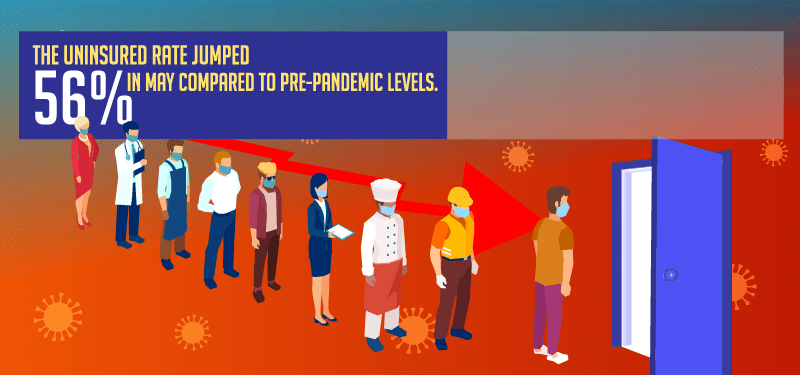
Michigan experienced some of the highest year-over-year growth in uninsured rates – 140 percent – in the country due to pandemic-related job loss, according to a new report from Seattle-based QuoteWizard.
Rates also increased the most in Massachusetts (167 percent) and Hawaii (150 percent). Michigan’s uninsured rate in May was 12 percent. The state’s unemployment rate was 14.8 percent. An estimated 5.4 million people in the U.S. don’t have health insurance as a result of job losses in February-May, many of which were caused by the COVID-19 pandemic.
QuoteWizard, a LendingTree company and online insurance marketplace, released the report. While not a one-to-one direct correlation, unemployment and uninsured rates are closely correlated.
“One of the most significant impacts of unemployment during the pandemic is the resulting number of people who have and will lose their employer-sponsored health insurance,” says Adam C. Johnson, senior research analyst at QuoteWizard, and author of the report. “Nationally, the uninsured rate rose 56 percent in May compared to pre-pandemic levels. Michigan’s rose 140 percent which was the third biggest increase in uninsured rates in the country. Michigan also ranked sixth for unemployment rate at 14.8 percent in June. Its uninsured rate in May was 12 percent.”
Unemployment fell by 0.9 percent in July, according to QuoteWizard, but unemployment is still 10.2 percent, and there are still more than 16 million unemployed Americans.
One of the most significant impacts of unemployment is the resulting loss of employer-sponsored health insurance. While some can seek Medicaid or other means of health insurance, many are left without viable or affordable health insurance options.
The Robert Wood Johnson Foundation predicts that more than 10 million people across the country will lose employer-sponsored health insurance by the end of 2020 as a result of pandemic-related job loss.
In eight states – South Carolina, Florida, Nevada, Mississippi, North Carolina, Oklahoma, Georgia, and Texas – 20 percent or more adults are uninsured. States with high unemployment experience the largest increases in uninsured rates.
QuoteWizard analyzed Bureau of Labor Statistics unemployment data from June 2020 and paired it with May 2020 uninsured data from the Kaiser Family Foundation and Families USA to see which states saw the greatest impacts from unemployment on uninsured rates during the COVID-19 pandemic. Rankings are based on a change in uninsured rates from 2018 to May 2020. States that saw the largest increases in uninsured rates from 2018 to May 2020 were also states that had the highest unemployment rates in June 2020.
LendingTree is an online marketplace that allows consumers to shop and compare offers for financial services. It is based in North Carolina.











